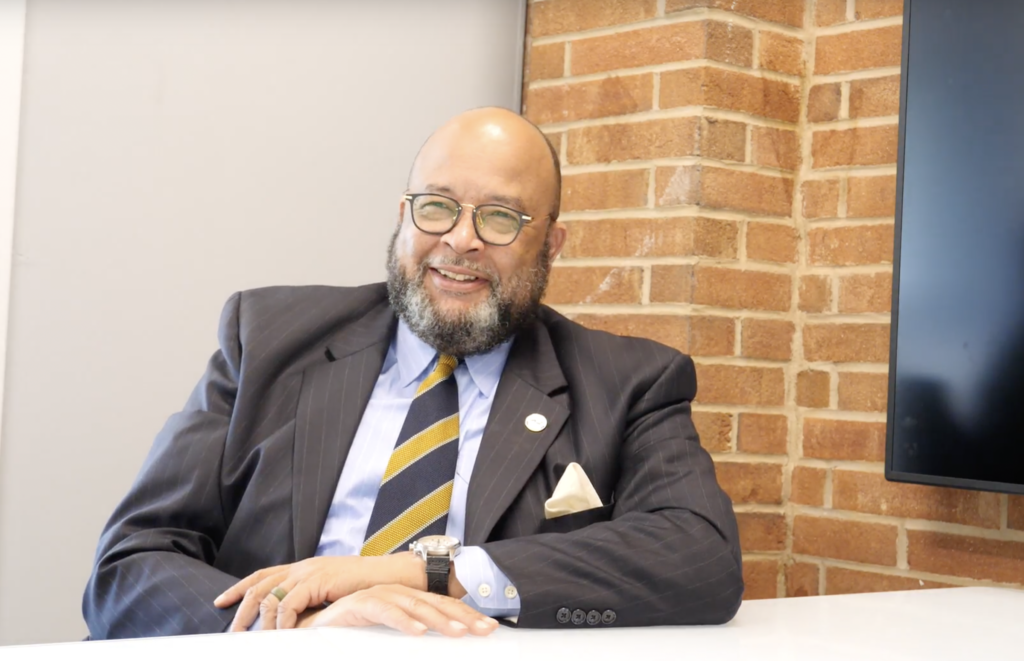
Dr. Thomas A. Walker, Jr.
Senior Advisor for Economic Development and Military Affairs for the University of North Carolina System
NCCCS History Project
This profile of Dr. Thomas A. Walker, Jr. is part of the Belk Center for Community College Leadership & Research’s NCCCS History Project Trailblazer profiles. The purpose of the NCCCS Trailblazer Profiles is to highlight and celebrate the work of leaders in the North Carolina Community College System, specifically focusing on current and former community college presidents. This profile is written in conjunction with the collection of an oral history interview with Dr. Walker that will soon be available in the Southern Oral History Project Archives. The interviews were conducted by members of the Belk Center for Community College Leadership staff in spring, summer, fall 2021, and spring 2022. Through these interviews, the Belk Center team hopes to re-center the conversations around who we recognize as important in the history of community college leadership in North Carolina, celebrate the work of our presidents, and inspire support for diversifying the presidential leadership pipeline.
Dr. Thomas A. Walker, Jr.
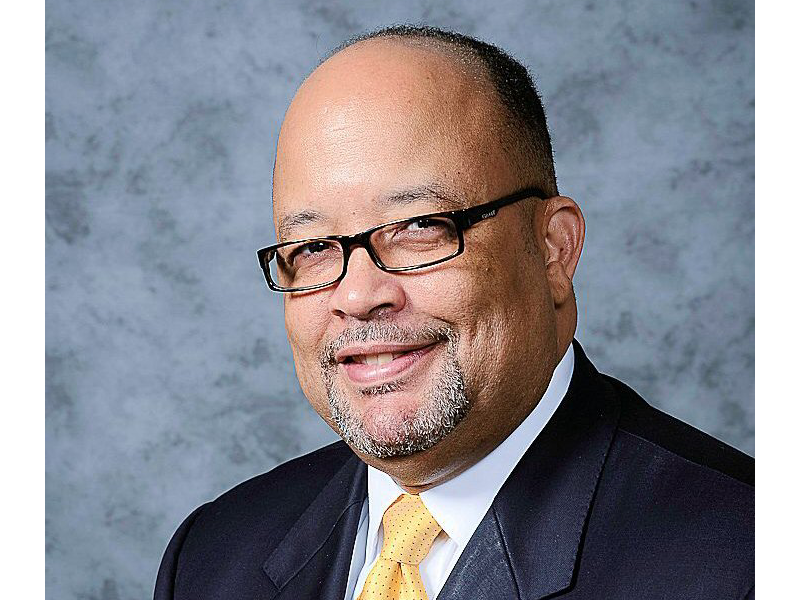
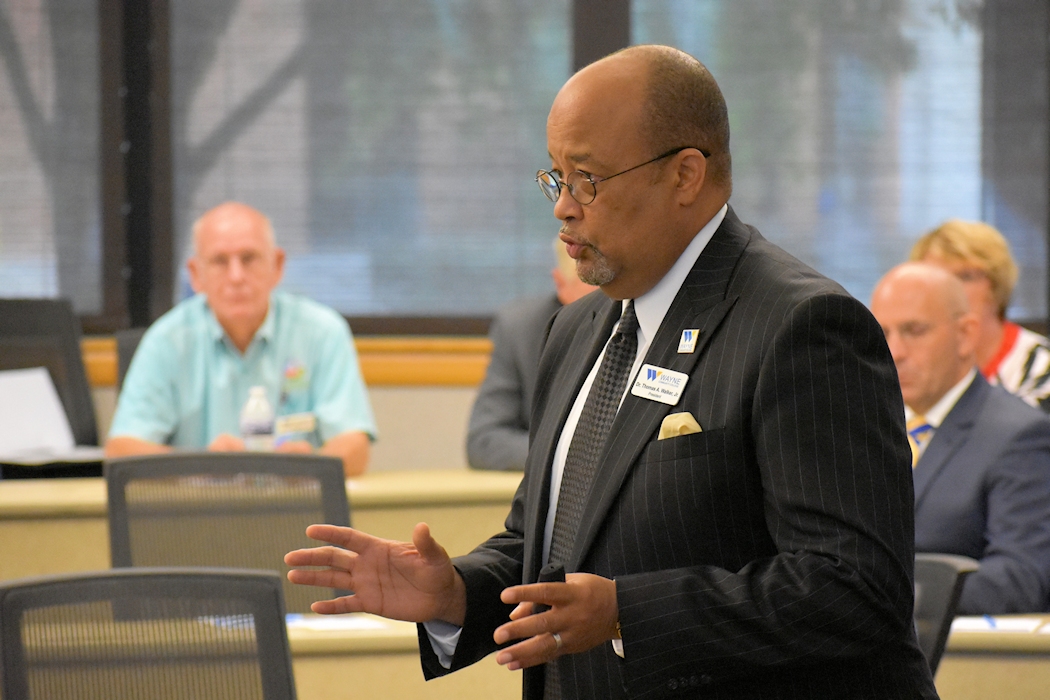
When Dr. Thomas A. Walker, Jr. accepted the role of Senior Advisor
From his upbringing in Robeson County to earning his undergraduate degree at the University of North Carolina at Chapel Hill, Walker’s love for the state, lifelong passion for education and dedication to helping those around him brought him exactly where he was meant to be.
Walker was born and raised in Lumberton, N.C., to parents who were educators. His father, an elementary school principal, taught him the value of work, and his mother, a middle school teacher, helped him to develop his love of reading and thirst for knowledge.
“Nothing gained my mother’s approval faster than her seeing me with a book in my hand. So, in a small rural town like Lumberton, I became a voracious reader. It gave me a love of reading and learning that I have not lost.”
And while his parents didn’t necessarily encourage him to pursue a career in education, Walker credits them for laying the foundation by helping him to develop an interest in reading and learning, and placing an immeasurable value on work ethic.
“It took me a little while to figure out what I was going to do professionally, and I certainly didn’t think it was going to be education. But as I reflect on my life, I was built for that…I’ve always been in a school environment,” Walker said. “Whether it was my father teaching me to do the best that I could or my mother being the English teacher that she was, it impacted where my energies went.”
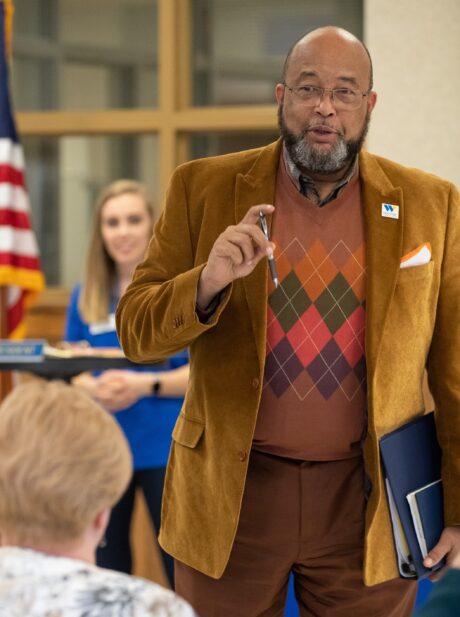
Walker attended the University of North Carolina at Chapel Hill, where he earned a bachelor’s degree in political science. Shortly after, he enrolled in the United States Marine Corps. Once he completed his service, Walker took his first job at a community college, followed by positions at the University of Tennessee and the State Technical Institute at Memphis (now Southwest Tennessee Community College). While these roles ignited a spark in Walker’s higher education career, it was encouragement from Dr. Charles Temple, then-president of the State Technical Institute of Memphis, that really solidified his path.
“He called me into his office and told me that the only job worth having was his, and strongly encouraged me to go back to graduate school. I was fortunate to be at an institution where they supported employees and that’s kind of where it crystallized for me.”
Following Temple’s advice, Walker enrolled at the University of Memphis and later graduated with a master’s degree in public administration and doctorate in higher education administration. While in Tennessee, he was introduced to another individual who would make a major impact on his career – Dr. Nebraska Mays, a former administrator at Tennessee State and Fisk universities. Just like Walker’s mother had said many years before, Mays insisted that colleagues be well-read so that in any conversation you find yourself in, you’d have something to contribute.
“Secondly, he said to make yourself essential. When things come up in the organization – committees or work that may not be in your area but allows you to grow – do it to better position yourself for the future,” Walker said. “Mays always said, ‘You don’t get degrees and then get put into a role, you get degrees and look for the experiences and the positions will find you.’”
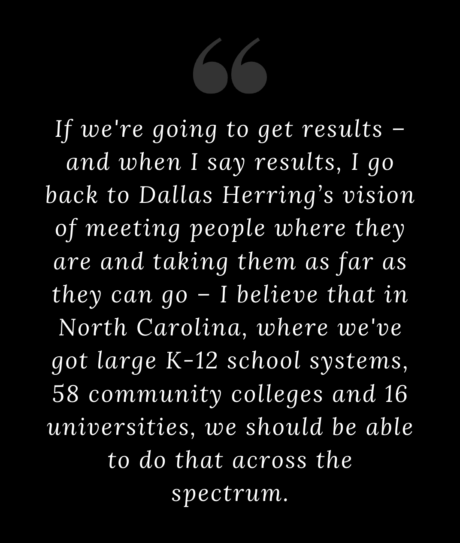
In the years ahead, Walker served in various roles throughout the country, including dean of administrative services at Metropolitan Community College in Kansas City, Mo., executive director of K.I.P.P. (Knowledge is Power Program) in St. Louis, vice president for student affairs at St. Louis Community College-Forest Park in Missouri, and as vice president for student and enrollment services and later as Grand Island Campus president – both at Central Community College in Nebraska.
In 2016, Walker returned to his home state to begin his tenure as president of Wayne Community College (WCC), and greatly credited his past experiences in preparing him for this new role.
“I’ve worked in rural community colleges and in urban community colleges. I’ve worked at community colleges with residence halls and huge athletic programs, and all of that really prepared me for the presidency at Wayne,” said Walker. “And the fact that I was born and raised an hour and a half from Goldsboro helped me to make an instant connection with the institution.”
In his five years as president, Dr. Walker was instrumental in moving WCC forward. Under his leadership, the college added new degree and certificate programs, constructed the automotive and collision repair center, began the development of the Center for Industrial Technology and Engineering and gained state and nationwide recognition for the college’s accomplishments. As a testament to Walker’s dedication to education and exceptional leadership at WCC, he was appointed as co-leader of the North Carolina Community College System Advisory Council Initiative on Diversity, Equity and Inclusion in July 2020. In this role, he and co-leader Dr. Donald Tomas of Southwestern Community College examined policies and practices of the 58 sister institutions, state administration and their boards to ensure that all colleges were celebrating diversity and working to remove existing systemic barriers.
Through his work on the System Advisory Council, Walker and his colleagues worked tirelessly to create educational environments where community members were treated equally. And while tremendous efforts have been made, he believes that the path to equity and racial justice within the North Carolina Community College System (NCCCS) is just getting started.
“To achieve our goals, we will have to be more strongly connected with North Carolina’s outstanding group of HBCUs,” said Walker. “I’m confident that we have great partnerships with them, but there’s more that can be done, certainly around program areas. And not just in the community college system…I think system-wide, K-12 and all the way up through four-year institutions.”
Walker also notes that racial justice is more than access – it includes educational equity, quality of teachers and much more. But it’s not going to happen if we don’t start preparing.
“As citizens, I think we’re failing at developing human beings to their fullest potential, and nothing’s worse than when you do that to children. I had a charmed life, not rich, but I was wealthy in all the important things.”
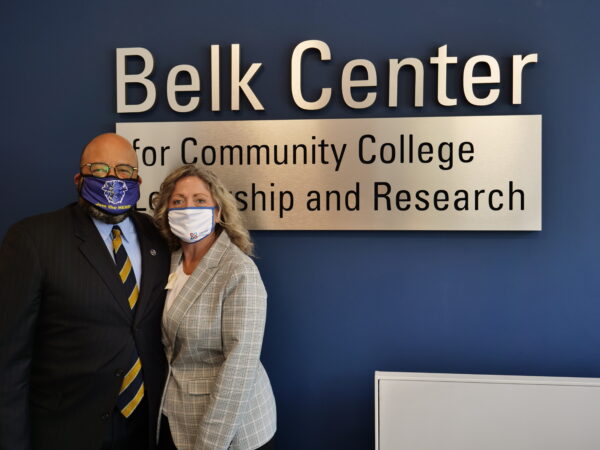
In July 2021, Walker accepted the role of senior advisor for economic development and military affairs for the University of North Carolina System. In this position, he wears many hats – from leveraging university assets and research to improve economic development, to liaising with the NCCCS and other entities to improve access to postsecondary educational opportunities, and finally, building partnerships and serving the military presence in the state of North Carolina. His efforts are certainly blazing trails across the state.
“Being a trailblazer is about finding your purpose. Picking up your cross every day and taking a few more steps. I always ask myself: Was I a better person today than I was yesterday? Did I make something a little better today than I did yesterday? And then that just ripples out,” said Walker. “I loved being president at Wayne Community College, it was the best job I’ve ever had, but I also knew I could grow more and take on something even a little more cumbersome. And I just think that’s what life is, at least for me, continuing to define your purpose.”
Walker is embracing the challenges of his new role and knows that in the years ahead, success will be measured not just by what he says, but how he puts those words into action.
“In the education world, I’ve found that it’s not always good to be the one doing the talking. I like to be in the background, moving the levers,” said Walker. “If we’re going to get results – and when I say results, I go back to Dallas Herring’s vision of meeting people where they are and taking them as far as they can go – I believe that in North Carolina, where we’ve got large K-12 school systems, 58 community colleges and 16 universities, we should be able to do that across the spectrum.”
Collection 1 | March 21st, 2022